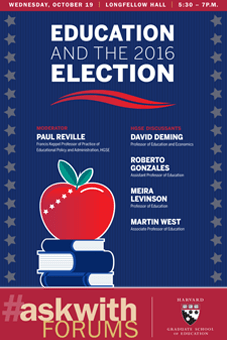On Oct. 19, faculty members of the Harvard Graduate School of Education will gather to explore where education fits into the 2016 election. How could the outcome of the election affect education in America? What will the next president really be able to do for education?
Share this article
An Education Election?
- Republican nominee Donald Trump has not released an education plan, but has supported expanding school choice, vouchers and reducing the cost of college. He is also “totally against” the Common Core State Standards.
- Democratic nominee Hillary Clinton’s plan includes “elevating” the teaching profession, rebuilding schools, breaking the school-to-prison pipeline, the expansion of affordable preschool and child care, and making college more affordable by offering free tuition at community colleges and four-year public universities.
- This year, “down-ballot” races like Question 2 on expanding the cap on charter schools in Massachusetts are generating particular interest as barometers for where state policy might move.
- Some estimate between 10 and 13 state legislative chambers are candidates to flip parties after this year’s elections, shifting the course of education policy in many states.
The Panel
- Professor Meira Levinson is co-editor of Making Civics Count. Her research investigates justice and democracy within schools.
- Associate Professor Martin West is the director of Harvard Kennedy School’s Program on Education Policy and Governance and the executive editor of Education Next.
- Assistant Professor Roberto Gonzales studies experiences of immigrant and Latino/a students in the U.S. education system in his recent book Lives in Limbo.
- Professor David J. Deming studies the economics of education and long-term outcomes.





